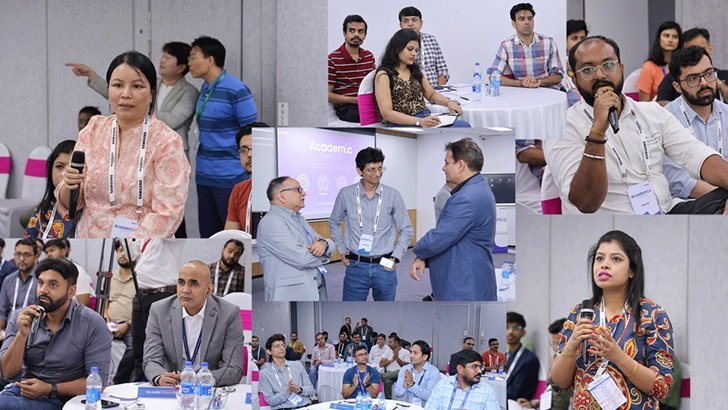Samsung Research Institute, Noida (SRI-N) hosted its first Academic Summit 1.0 in October, marking a transformative moment in interdisciplinary collaboration.
The first-of-its-kind event brought together top leaders from industry and academia, highlighting the power of knowledge exchange and innovation to shape the future of education, research and technological advancement in India.
The summit attracted prominent attendees including directors, deans, professors from prestigious Indian Institutes of Technology (IITs) such as IIT Delhi, IIT Bombay, IIT Kanpur and IIT Ropar, as well as members of Samsung headquarters. The gathering focused on cutting-edge areas such as visual AI, graph neural networks (GNNs), neurosemiotic AI, and health AI, and emphasized the importance of fostering partnerships between academia and industry.
vision for the future
The event began with a keynote address by KY Roo, Managing Director of SRI-N, who welcomed participants and highlighted the summit’s potential to redefine the future of research and innovation. “Academic Summit 1.0 aims to create a collaborative platform where academic excellence and industrial ingenuity meet. By fostering this dialogue, we will address real-world challenges and “We envision breakthrough solutions that will shape the future of technology,” he said.
Insights from IIT leaders
Among the prominent speakers were Professor Rajeev Ahuja, Director, IIT Ropar, and Professor Tarun Gupta, Dean, IIT Kanpur, who emphasized the need for deeper engagement between academia and industry. They highlighted how joint efforts can foster innovation, strengthen the internationalization of education, and deliver impactful research to industry in a timely manner.
Professor Ahuja emphasized that IITs, with their strong intellectual foundations, have unparalleled potential to collaborate with industry leaders such as Samsung to create innovative technologies. “By partnering with Samsung, we can accelerate India’s growth as a technology powerhouse,” he said.
Groundbreaking research presentation
Throughout the summit, IIT researchers announced several groundbreaking projects.
Professor Santosh Kumar Vipparthi shared his research findings on deep learning-based burst super-resolution, which explores how AI can improve imaging techniques.
Professor Sayan Ranu presented on graph neural networks and their applications for Samsung Electronics, a major innovation area in data processing.
Professor Koteswar Rao Jerripothula has delved into binary segmentation with a collection of different foreground detection models, offering potential advances in image analysis.
Professor Tushar Sandhan introduced an innovative approach that uses pose and lighting constraints to generate portrait backgrounds and address visual enhancement.
Professor Kshitij Jadhav discussed the role of AI and machine learning in healthcare transformation, with a special focus on the high accuracy of AI models on low-label data.
Professor Srikanta Bedathur presented on multimodal and neurosemiotic AI for Knowledge Graph Questioning Answering (KGQA).
Strengthening industry-academia collaboration
The summit’s numerous networking sessions helped foster deeper collaboration between academia and industry. Participants engaged in lively discussions and explored potential partnerships that could lead to joint research projects and innovations.
Feedback from attendees was overwhelmingly positive, with many expressing gratitude for the opportunity to engage with thought leaders and industry experts.
“The summit provided a unique platform to connect, learn and collaborate. These interactions will definitely drive future research initiatives,” said a participant from SRI Noida.
The power of collaboration
The success of Academic Summit 1.0 demonstrated the power of interdisciplinary collaboration in addressing the world’s biggest challenges, from digital transformation to medical innovation. Key takeaways from the event included the importance of bridging the gap between academia and industry to foster innovation and deliver impactful solutions.
Going forward, Samsung Research Institute Noida aims to build on the momentum of this inaugural event and continue to create avenues of collaboration that will shape the future of technology in India and the rest of the world. As SRI-N moves forward, future editions of the Summit are poised to play an even greater role in driving innovation and advancing technology frontiers.
Academic Summit 1.0 sets a strong precedent for future events and reinforces Samsung’s commitment to fostering collaboration between academic institutions and industry. By promoting knowledge exchange and innovation, Samsung not only pushes the boundaries of technological advancement, but also contributes to the development of a brighter and more innovative future for India.

